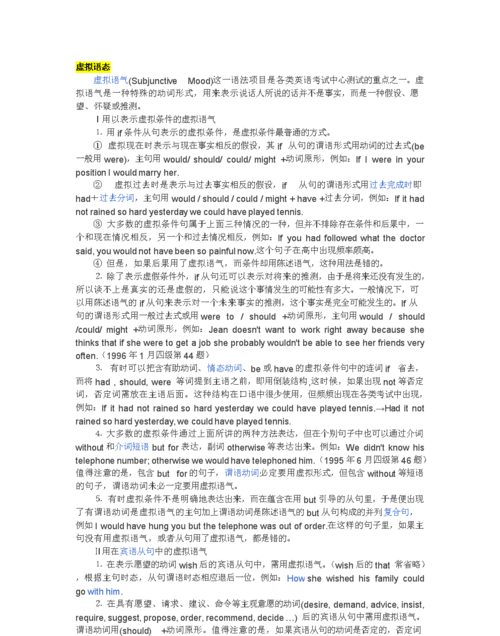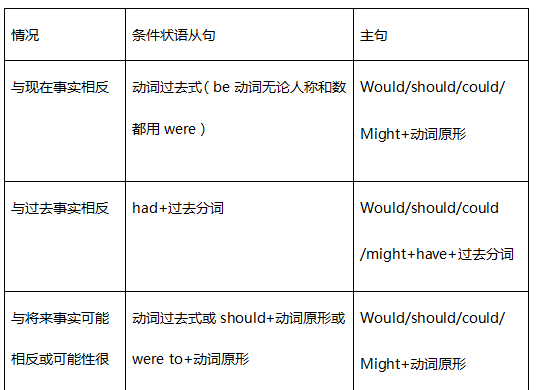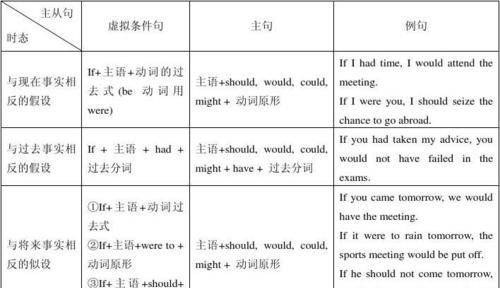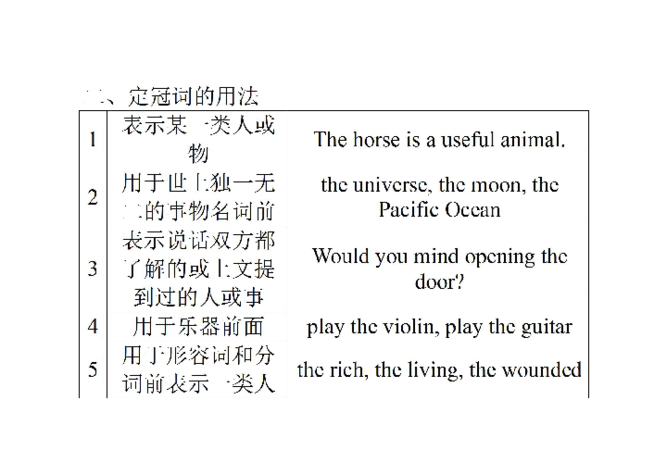本文目录
英语的虚拟语气的用法
现将虚拟语气在条件句中的各种具体形式和用法分述如下:1、对现在的虚拟,表示与现在事实相反的假设时,条件状语从句的谓语动词用过去式(be的过去式用were.而主句中的谓语动词用would (should, could, might) + 动词原形。见下表:条件状语从句的动词形式主句的动词形式If+主语+动词过去式(be的过去式were.在口语等非正式场合中,I,he,she,it等后面也可用was.但在If I were you中,一定要用were,不能用was.I (we)should+动词原形主语+would (might,could)十动词原形1、例句:If I were you, I should study English. (fact: I am not you, so I shall not study English.)If he had time, he would attend the meeting.(fact: He does not have time, so he will not attend the meeting.)If they didn’t take physical exercises every day, they wouldn’t be so healthy. (fact: They take physical exercises every day, so they are very healthy.)If you went to bed earlier, you would not be so sleepy in the morning. (fact: You often go to bed late, so you are always sleepy in the morning.)If this were the case, it would be very awkward.(fact: This is not the case, so it is not awkward.) Now let’s do some translation: 要是没有虚拟语气,英语就会容易多了。If there were no subjunctive mood, English would be much easier. 如果我是你,我就在房屋周围种些树。If I were you, I would (should) plant some trees around the house.如果我把头发染成蓝色,人人都会笑话我。If I dyed my hair blue, everybody would laugh at me. Or: I would (should) be laughed at by everybody. 要不是她这么忙,她就会出席今天下午的会议了。If she were not so busy, she would attend the meeting this afternoon. 2、对过去的虚拟,表示与过去的事实相反的假设时,条件状语从句的谓语动词用过去完成时,主句的谓语动词用would (should, could, might)+过去分词。见下表:条件状语从司的动词形式主句的动词形式If+主语+had+过去分词i(we)should+have+过去分词主语+could (might,could)+have + 过去分词 3、表示与将来事实相反的假设,对将来表示怀疑,或将来的动作不太可能实现时,条件状语从句和主句的谓语动词有以下形式:(见表)条件状语从句的动词形式(三种)主句的动词形式(1)if十主语+动词过去式(be的过去式用were),通常要与一个表示将来的时间状语连用.(2)If+主语(任何人称和数)+should+动词原形(3)if+主语(任何人称和数)+were to+动词原形I(we)should+动词原形主语+would (might, could)+动词原形请看以下句子:1)If it rains tomorrow, our picnic will be put off. (说明:The weather has been very changeable these days.) 条件状语从句的谓语动词用现在时,表示说话人认为下雨的可能性很大。2)If it rained tomorrow, our picnic would be put off. (说明:The weather has been very good these days.) 条件状语从句的谓语动词用过去时,表示说话人认为下雨的可能性不大。3)If it should rain tomorrow, our picnic would be put off. (万一明天下雨,我们的野餐就推迟)。条件状语从句的谓语动词用should+动词原形,说明下雨的可能性很小或没有可能,如果下雨,那将是出乎意料的。4)If it were to rain tomorrow, our picnic would be put off.这句话与上一句意思几乎一模一样。If you should fail, what would you do?要是我明天真的见到她,我就把真相告诉她。If I were to see her tomorrow, I would tell her the truth.万一明天下雨,会议就推迟。If it were to rain tomorrow, the meeting would be put off.我打赌巴西会赢得世界杯。要是巴西输了,我就请你搓一顿。I bet Brazil will win the World Cup. If it should lose, I would treat you a meal.4、当条件状语从句表示的行为和主句表示的行为所发生的时间不一致时,动词的形式要根据它所表示的时间来调整。这与以上三种情况不同,虚拟语气的谓语动词形式没有遵循以上规律。For example:If you had worked hard, you would be very tired. (从句说的是过去,主句指的是现在。)If he had followed the doctor’s advice, he would be quite all right now.If I were you, I would have gone home. Now let’s do some translation:如果她过去没有刻苦训练的话,就不会跑得这么快。(从句动作指的是过去,主句指的是现在的情况)(Fact: She has trained very hard, so she is able to run very fast now.)If she hadn’t trained so hard, she wouldn’t be able to run so fast.5. 以上句型可以转换成以下形式:1)条件状语从句省略if:在书面语中,如果条件状语从句的谓语中有were, had 或should, 就可以省略if, 并将were, had 或should 放到句首,谓语主语之前,用 “Were/Had/Should + 主语”的形式。这种虚拟语气在意义上与带if 的条件状语从句相同。当然,如果从句没有were, had, 或should,就不能省略if.Now let’s look at some examples:If I were to do it, I’d do it some other way. →Were I to do it, I’d do it some other way.If you should fail, try again. →Should you fail, try again.If you had been here earlier, you would have seen him. →Had you been here earlier, you would have seen him.但是,If you came tomorrow, we would have the meeting.这句话if 就不能省略。而且,在虚拟条件状语从句中,省略了if的倒装形式的句首不能用动词的缩略形式。如我们可以说:Were it not for the expense, I would go to Italy.但不能说:Weren’t it for the expense, I would go to Italy.Please do not use “if”:如果我是你,我每天早上就早起床。Were I you, I would get up early every morning.要是明天有会议,我就会来。Should there be a meeting, I would come.2)用介词短语代替条件状语从句。(可以改为条件状语从句)。例如:Without air, there would be no living things.But for your help, I couldn’t have done it.Without electricity human life would be quite different today. Now let’s do some translation. 请用介词短语代替条件状语从句。要不是你的帮助,我就失败了。But for (except, without) your help, I would have failed.如果没有恰当的控制手段,核反应堆就会爆炸。Without proper means of control, a nuclear reactor would explode.3)用其他方式代替条件状语从句(可以改写为条件状语从句。)例如:It would produce bad results to do that. 用动词不定式 =If you did that/should do that, it would produce bad results.She would have come, but she wasn’t informed, nor invited. (用but.)=She would have come, if she had been informed or invited.A more responsible person would not have left the work half done. 一个更负责的人是不会把工作做到一半就不管的。(用比较级) =If you (he, she) were more responsible, you (he, she) would not have left the work half done. 我应该早点写完这封信,但我一直很忙。 I should have written the letter earlier. But I have been very busy. 要能登上珠穆朗玛峰,那经历该多棒!It would be a fantastic experience to climb up to Mount Everest. 6、虚拟语气省略条件从句或主句表示虚拟语气的条件句的主句或从句有时可以省略,而省略部分的含义仍有所体现。1)省略条件从句,如:It would be very nice.You could have done it yourself. (省略If you had wanted to.上下文可以看出You didn’t want to.) (Fact: You didn’t do the work yourself because you didn’t want to.)I wouldn’t smoke. (省略If I were you.) (表面上说我,实际上说你。这是一种委婉的表达法。(Fact: You smoke very often. I advise you not to smoke any more.)2)省略主句:在强调条件从句时,常省略主句,这种句子常表示一种“已不能实现”的愿望,主要用于If only 引导的感叹句中。For example:If only he were here!If only I knew more!If only he had stayed with us! Now let’s do some translation:要是我听了他的建议就好了!If only I had taken his advice!我如果是一只鸟就好了!If only I were a bird.快用If only 造三个句子,表达你的愿望!If only I could live in a big apartment!If only I were a billionaire!If only I could marry her/him! (二)虚拟语气的其他句型和用法1、用在“wish+宾语从句”中,表示很难实现或不能实现的愿望,可以翻译为“但愿…”, “悔不该…”等。表示现在不能实现的愿望,从句的谓语动词用过去式;表示将来的愿望,从句的谓语动词用“would (could)+动词原形”;对过去的事情表示愿望,从句的谓语动词用 “had+过去分词” 或“could + have + 过去分词”。Wish 后面的宾语从句必须用虚拟语气,不管这个愿望是否能实现。如:I wish it were Spring all the year round.I wish you could go with us.We wish we had arrived there two hours earlier. Now let’s do some translation using “wish”:我要是Jane 就好了。I wish I were Jane.他真希望自己生活在中世纪。He really wishes that he were living in the Middle Ages.但愿北京整年是秋天。I wish it were autumn in Beijing all the year round.要是你能同我们一起过寒假就好了。We wish you would spend the winter vacation with us.我要是没有买这辆车就好了。I wish I had not bought this car. 注意:wish 与hope接宾语从句的区别在于:hope表示一般可以实现的希望,宾语从句用陈述语气。Wish表示很难或不大可能实现的愿望,宾语从句用虚拟语气。请比较:We hope we will succeed. (We don’t know if we will succeed.)We wish we would succeed. (We know we can hardly succeed.)2、用在as if/as though,或even if/even though引导的从句中: 这时,如果从句中表示的动作发生在过去,则谓语动词用had+过去分词形式;如果指的时现在的状况,则用过去式(be用were);指将来则用would(should, could)+动词原形。这里只看从句动作发生的时间,与主句的时态没有关系。3、在It is (high) time (that)…句型中,后面的从句的谓语动词常用过去式(be的过去式用were), 或用should+动词原形(should 不能省略)来表示。这句话的意思是“(现在)该…”。For example:It is high time that you got married.It is time that I bought a car.Now it is time that you made some sentences by using this pattern. Think about what you should do now. 该你用这个句型造几个句子了。It is high time that I should lose some weight.It is time that I bought an apartment.It is time that we took a rest.4、在 I would rather (that)…句型中,后面的从句的谓语动词用过去式(be的过去式用were)。这句话的意思是“我宁可…”,表示说话人的意愿。I’d rather I were in the rain now.I’d rather you did not tell him.5、用在suppose开头的祈使句中,从句的谓语动词变化与as if后面的动词变化规律相同,用过去式、过去完成式、或过去将来式。意思是“假如…”,但suppose 是动词,不是连词。如:Suppose the boss walked in. What should I do?Suppose Saddam had not been captured. What would the U.S. do?Suppose Chen Shui-bian should declare Taiwan independent. What would China do?6、用在for fear that或lest引导的从句中,表示“怕…”“万一…”等意思。从句的谓语动词用should+动词原形,should 可以省略。如:7. 在表示建议、要求、命令等意思的动词,如arrange, command, demand, desire, insist, order, propose, request, require, suggest, beg, move(提议)后面的宾语从句中,谓语动词用should + 动词原形,should 可以省略,而引导宾语从句的that 不能省略。医生建议,即使在节假日人们也不应该熬夜。Doctors suggest that people should not stay up late even on holidays. :suggest 表示“暗示”时,宾语从句不用虚拟语气。Insist后面强调的是事实时,宾语从句也不用虚拟语气。如:The neighbor suggested that his wife was having an affair.He insisted that he was right.Mike insisted that he had never stolen anything.8、使用上述表示建议、要求、命令等意思的动词派生的名词,或在这些动词用作名词时,名词之后的从句用虚拟语气,即从句的谓语动词用should+动词原形,should 可以省略。从句的引导词that 不能省略。这与上述第7项类似。如:Our suggestion is that education not be industrialized. = We suggest that education not be industrialized.The president’s decision is that the war against terrorism be launched at the right time. =The president decided that the war against terrorism be launched at the right time.9、上述动词在It is suggested that…, It is required that…, It’s requested that…, It’s ordered that…, It’s arranged that…句型中,that 之后的从句用虚拟语气,即谓语动词用should+动词原形, should 可以省略,但引导词that 不能省略。如:It was suggested that he attend the conference.It was requested that the trial be openly reported.10、在It’s important (imperative, necessary, essential, vital, desirable, advisable, better) that…句型中,that 引导的从句用虚拟语气,即谓语动词用should + 动词原形,should可以省略。这个句型表示说话人的意见、要求等。For example:It is desirable that your wedding be postponed until next July.It is imperative that the board chairman be present at the board meeting.

高中英语倒装句 虚拟语气所有语法要点 最好不要复制
虚拟语气语法要点:
一、be-型虚拟式
1、用于表示命令、决定、建议等词语之后的that-分句中
a、用在decide,order表示决定或命令等动词之后的that-分句中。例如:
He ordered that all the books be sent at once.
b、用在advisable,essential,important等形容词之后的that-分句中。例如:
It is essential that all the facts be examined first.
c、用在decision,demand,requirement等名词之后的that-分句中。例如:
There decision was that the school remain closed.
2、用于if,though等引导的分句中
be-型虚拟式能用于由if,though,whatever,lest,so long as等引导的分句中表示推测、让步、防备等含义。例如:If he be found guilty,John shall have the right of appeal.
二、were-型虚拟式
此用法常用于由if,if only,as if,as though,though引导的条件状语从句和让步状语分句中,表示非真实的条件和让步。例如:
If i were you ,i should wait till next week.
If only i were not so nervous.
用于某些名词性分句中,此用法还可以用于wish,would rather,suppose,imagine之后的that-分句中,表示一种臆想的,通常是不可能发生的情况。例如:
I wish it were spring all the year around.
I would rather i were not at the side of the accident.
倒装:
一、当主语补语提前时,如果主语结构太长或比较复杂,有可能引起倒装。
Happy indeed are those who receive marvellous news after a long silence.
二、当前置宾语由“not a +名词”或者“ not a single+名词”构成时,也会引起倒装。例如:
I had a terrible time playing ronlrtte at the casion .Not a winning number did i have all night.
三、状语的前置也会引起倒装,有两种情况:全部倒装和部分倒装
例如:the door burst open and in rushed the crowd.
in this chapter will be found a partial answer.
never have i found him in such a good mood.
only yesterday did he find out that his watch was missing.
not only did he complain about the food,he also refused to pay for it.
so small was the mark that i could hardly see it.
(每个句子代表一种用法,就记住例子就好...)

英语的虚拟语气怎么用?
虚拟语气
1.主语从句中的虚拟语气主语从句中的虚拟语气主要取决于某些形容词和过去分词,用来表示建议、命令、要求、惊异和失望等。其形式为:(should)+动词原形。
常这样用的形容词有:
appropriate适当的advisable适当的,合理的better较好的desirable理想的essential精华的imperative迫切的important重要的insistent坚持的natural自然的necessary必要的preferable优越的,较好的strange奇怪的urgent紧迫的vital极其重要的
过去分词有:
desired, demanded, ordered, requested, suggested, recommended, required等。
例如:
It is essential that you (should) win the voters’hearts.赢得选民的心是绝对必要的。
It was suggested that he (should) join the club activities.有人提议他应该参加俱乐部的活动。
2.表语从句和同位语从句中的虚拟语气在表示建议、命令、主张、目的和愿望等名词后面的表语从句和同位语从句中谓语动词要求使用虚拟语气。其形式为:(should)+动词原形。
常这样用的名词有:
resolution决心,决议pray恳求decision决议motion提议suggestion建议preference选择proposal提议advice劝告recommendation推荐desire愿望demand要求requirement要求order命令necessity必要性request要求idea主意、想法例如:
He gave orders that the guests (should) be hospitably entertained.他下令热情款待这些客人。
His proposal is that we (should) get rid of the bad habits.他提议我们应该摈弃这些不良习性。
3.宾语从句中的虚拟语气
1)某些动词后所接宾语从句中的谓语动词要求用虚拟语气,用来表示建议、命令和要求等。其形式为:(should)+动词原形。常这样用的动词有:
ask要求advise劝告determine决定decide决定command命令insist坚持intend打算move提议prefer宁愿propose提议order命令recommend推荐request要求require要求suggest建议urge主张demand要求desire渴望direct命令例如:
He insisted that the meeting be put off.他要求推迟那个会议。
They proposed that all the plans should be discussed at the meeting.他们建议所有的计划都应该在会上讨论。
2)在以it为形式宾语的复合宾语从句中也可以用虚拟语气,其形式为:(should)+动词原形。这一句型中使用的形容词(宾补)与主语从句中的虚拟语气所使用的形容词相同。例如:
We think it advisable that he (should) think deeply before acting.我们认为他在行动之前好好考虑一下才是明智的。
3)wish后面所跟的宾语从句中的虚拟语气表示某种不能实现的愿望。
其主要形式有三种:
表示对现在情况的虚拟:wish +主语+动词过去式或were表示对过去情况的虚拟:wish +主语+ had +过去分词表示对将来情况的虚拟:wish +主语+ would +动词原形。
例如:
I wish I knew what was going to happen.但愿我能知道要发生什么事。
She wished she had stayed at home.她懊悔的是她当时要是在家就好了。
I wish I were rich.我恨不得我很有钱。
注意:在表示对过去情况的虚拟时,有时也可以用下列形式:
wish +主语+ would(could)+ have +过去分词I wish I could have seen her last night.要是我昨天晚上能够见到她那该多好。
4. if条件句中的虚拟语气形式1)if非真实条件句所表示的假设则是不可能或不大可能发生或实现的,句中的主句与从句都用虚拟语气。
在if非真实虚拟条件句中,主句和从句谓语动词主要有下面几种形式:
假设类型条件从句谓语动词形式主句谓语动词形式与现在事实相反动词过去时(be用were)Should(would,could,might)+动词原形与过去事实相反Had +过去分词Should(would,could, might)+ have +过去分词与将来事实可能相反动词过去时(should+动词原形,were to +动词原形)Should(would,could,might)+动词原形
If there were no gravity, we should not be able to walk.假如没有引力,我们就不可能行走。
I wouldn’t have known what these were for if I hadn’t been told.假如别人不告诉我,我就不知道这些东西是干什么的了。
2)正式文体中,有时可把虚拟条件句中的连词if省去,而将were,had, should等助动词(不包括行为动词)提到主语前面。如果句中没有were,had或should时,既不能省略if,也不能倒装。例如:
Were I to meet him tomorrow (= If I were to met him tomorrow), I should ask him about it.要是我明天见到他,我就会问他这件事的。
Had I had the money last year (= If I had had the money last year), I would have bought the house.如果我去年有了这笔钱,我就买那所房子了。
Should there be any trouble with the boiler, the automatic controlling unit would cut off the fuel oil supply.假如锅炉出问题的话,自控装置会自动切断燃油的供给。
3)通常情况下,在非真实条件句中主句和从句的谓语动词所指时间是一致的,但有时也可能指不同的时间,这时要根据上下文的意思采用不同的谓语动词形式。例如:
If I were you, I would have taken his advice.我要是你,我就采纳了他的建议。(从句指现在,主句指过去)
If the weather had been more favorable, the crop would be growing still better.如果气候更适宜一些,庄稼会长得更好。(从句指过去,主句指现在)
5.含蓄虚拟条件句1)有时假设的情况并不以条件从句形式表示出来,而是通过一个介词短语或其他方式表示。常用的词或短语有:without, but for, but that, otherwise, or, but等。例如:
Without your help (=If we had not had your help), we could not have succeeded.要是没有你的帮助,我们就不会成功的。
But for electricity (= If there were no electricity), there would be no modern industry.要是没有电,就不会有现代工业。
He was having a meeting; otherwise he would have come over to help us.他当时正与他的学生进行讨论,否则的话他就来帮我们了。
He felt very tired yesterday, or he would have attended the party.他昨天很累,不然他就参加那个聚会了。
2)在某些暗含虚拟条件的简单句中,虚拟语气可通过上下文表现出来。谓语动词用should/ would be形式和should/ would have been虚拟形式。例如:
Any men in his position would have done like that.任何人处在他的位置都会那么做的。
You should (ought to) have come earlier.你本应来得早点。
6.其他句型中的虚拟语气1)在would rather, would sooner, would just as soon, might as well和would prefer等后面所跟的从句中,也可以用虚拟语气,表示愿望,意为“宁愿、但愿”。其形式为:
①“would rather (would sooner…) +主语+谓语动词过去式”表示现在或将来的情况。
②“would rather (would sooner) +主语+动词过去完成式”表示过去的情况。例如:I’d rather he didn’t go now.要是他现在不走就好了I’d just as soon you had been here yesterday.要是你昨天在这里就好了。
2)在句型“It is (high/ about) time…”后面也可以跟虚拟语气,从句中常用过去式。有时也用“(should)+动词原形”,意为“该是……的时候了”。例如:
It is time that the boy (should) go to school.这个小孩该上学了。
It is high time (that) the weather improved.天气真该好起来了。
3)在“if only”引起的感叹句中也要求用虚拟语气,表示愿望。
形式为:①用过去时或“would/ could +动词原形”表示与现在或未来事实相反的愿望。
②过去完成时表示与过去事实相反的愿望。例如:
If only you would listen to our advice.要是你听我们的建议就好了。
If only I had not been busy last week!要是上周我不忙该多好啊!
If only she could marry me.但愿她能嫁给我。
注:if only也可以用于虚拟条件句中。例如:
If only I had more money, I could buy a car.要是我有更多的钱,我就可以买辆车了。
4)连接词“in case, lest, for fear that”可以用来引导虚拟语气。其形式通常为:“…lest (in case, for fear that) +主语+ should +动词原形”。Lest, for fear that句中的should可以省去,in case句中的should通常不省去,但是in case句中可以不用虚拟语气,而用陈述语气。Lest, for fear that后面也可以接其他形式。例如:
He took his coat with him in case it should rain.他带着雨衣以防下雨。
I will not make a noise for fear that I (should/ might) disturb you.我不会做声的,以免打扰你。
Care must be taken in using this method lest overflow (should) occur.在使用这以方法的时候要谨慎小心,以免发生溢流现象。
参考资料:***/f?kz=146197334

英语虚拟式
1.she insists he should take his vacation now .
2. i had recommended that he should place in a more responsible position .
3.i suggested that he should finish up that project quickly
4.i demanded tahe he should accompany me to the hearing
5.the general commanded the soldiers should advance immediately
6.i would rather mary to type the letters.
7.it was necessary that he should leave immediately
8.it is important that he should be nominated
9.he advised she should wait for a few weeks
10.the board has instructed the manager should quit

以上就是关于英语虚拟式的用法 ,英语的虚拟语气的用法的全部内容,以及英语虚拟式的用法 的相关内容,希望能够帮到您。

